ASP in Colorado: Climate Change and Security in the Heartland
On Wednesday and Thursday, September 9th and 10th, representatives of the American Security Project visited Denver, Colorado and Colorado Springs, Colorado, for a series of meetings, public events, and briefings on how climate change is affecting security, how institutions in the region are planning for it, and how.
Attending were Lieutenant General John Castellaw, USMC (Ret.) and Lieutenant General Arlen “Dirk” Jameson, USAF (Ret.). Castellaw was a 36 year veteran of the Marine Corps and now serves as the Director of the Crockett Policy Institute and a member of the ASP Board. Jameson served in the Air Force for more than three decades, most of them in strategic missile forces; since retirement, the lifelong Texan has been involved in military and commercial space businesses and has served as Executive Director of the Texas Telecommunications Infrastructure Fund. Both are members of ASP’s Consensus for American Security. Lt Colonel Hal Bidlack, Ph.D., USAF (Ret.), ASP Fellow, and Porter Brockway, ASP’s events manager, rounded out the delegation.
Denver World Affairs Council
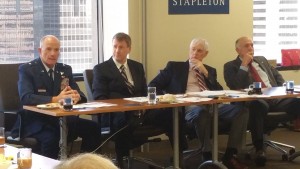 Wednesday morning began with the breakfast hosted by the Denver World Affairs Council. Over 20 local leaders from business, government, legal, and military sectors attended the discussion. Bidlack began the discussion by laying out the science and facts of climate change. Generals Castellaw and Jameson discussed the wide-ranging global effects of climate change on national security, both for military planners in the United States as well as a variety of nations around the globe directly threatened by climate change. Brigadier General Jerome P. Limoge, Jr., Assistant Adjutant General – Air, Colorado National Guard, then spoke on the challenges of climate change in Colorado, and the impact of those changes on National Guard resources. Limoge specifically referenced the deployment of military resources to deal with massive wildfires that claimed hundreds of homes in the Colorado Springs area, as well as subsequent major flooding requiring significant Guard resource deployment. Following General Limoge’s remarks, a question-and-answer period covered a variety of topics including international crisis points exacerbated by climate change and the challenges that water management presents globally.
Wednesday morning began with the breakfast hosted by the Denver World Affairs Council. Over 20 local leaders from business, government, legal, and military sectors attended the discussion. Bidlack began the discussion by laying out the science and facts of climate change. Generals Castellaw and Jameson discussed the wide-ranging global effects of climate change on national security, both for military planners in the United States as well as a variety of nations around the globe directly threatened by climate change. Brigadier General Jerome P. Limoge, Jr., Assistant Adjutant General – Air, Colorado National Guard, then spoke on the challenges of climate change in Colorado, and the impact of those changes on National Guard resources. Limoge specifically referenced the deployment of military resources to deal with massive wildfires that claimed hundreds of homes in the Colorado Springs area, as well as subsequent major flooding requiring significant Guard resource deployment. Following General Limoge’s remarks, a question-and-answer period covered a variety of topics including international crisis points exacerbated by climate change and the challenges that water management presents globally.
National Renewable Energy Laboratory
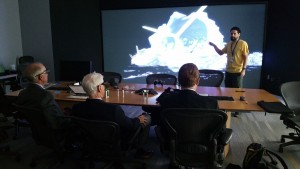 The delegation next visited the National Renewable Energy Laboratory (NREL) in Golden Colorado. James Bosch, NREL Communications and Public Affairs Office, conducted an extensive tour of the organization’s headquarters and laboratories. As per their mission statement, “NREL develops clean energy and energy efficiency technologies and practices, advances related science and engineering, and provides knowledge and innovations to integrate energy systems at all scales.” NREL partners with a wide variety of private-sector corporations, as well as federal, state, and local governments, and international partners. The Golden campus of NREL focuses primarily on solar energy issues, having grown from a 1970s initiative on solar energy. NREL is also doing extensive work in bioenergy, biomass, energy efficiency, transportation, and other areas of renewable energy production. A separate campus contains a wind farm, focused on developing the most efficient wind turbines possible. The delegation toured a number laboratories exploring renewable energy production in ways that maximize energy production while minimizing cost. The cutting-edge research being done at NREL includes technologies that might double the efficiency of solar cells while making them thinner, flexible, and more resistant to hail damage, to the point they might be able to be used for primary roofing material in buildings. NREL is also exploring hydrogen–powered vehicles, and maintains one of only two hydrogen fueling stations in the Rocky Mountain region.
The delegation next visited the National Renewable Energy Laboratory (NREL) in Golden Colorado. James Bosch, NREL Communications and Public Affairs Office, conducted an extensive tour of the organization’s headquarters and laboratories. As per their mission statement, “NREL develops clean energy and energy efficiency technologies and practices, advances related science and engineering, and provides knowledge and innovations to integrate energy systems at all scales.” NREL partners with a wide variety of private-sector corporations, as well as federal, state, and local governments, and international partners. The Golden campus of NREL focuses primarily on solar energy issues, having grown from a 1970s initiative on solar energy. NREL is also doing extensive work in bioenergy, biomass, energy efficiency, transportation, and other areas of renewable energy production. A separate campus contains a wind farm, focused on developing the most efficient wind turbines possible. The delegation toured a number laboratories exploring renewable energy production in ways that maximize energy production while minimizing cost. The cutting-edge research being done at NREL includes technologies that might double the efficiency of solar cells while making them thinner, flexible, and more resistant to hail damage, to the point they might be able to be used for primary roofing material in buildings. NREL is also exploring hydrogen–powered vehicles, and maintains one of only two hydrogen fueling stations in the Rocky Mountain region.
Former Governor Bill Ritter
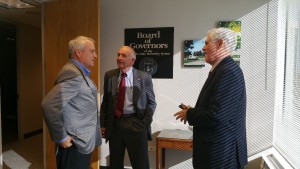 The final meeting on Wednesday for the delegation was with former Colorado Gov. Bill Ritter. He is the founder and director of the Center for the New Energy Economy (CNEE) at Colorado State University which launched on February 1, 2011. The Center works directly with governors, legislators, regulators, planners, policymakers, and other decision makers. It provides technical assistance to help officials create the policies and practices that will facilitate America’s transition to a clean-energy economy.
The final meeting on Wednesday for the delegation was with former Colorado Gov. Bill Ritter. He is the founder and director of the Center for the New Energy Economy (CNEE) at Colorado State University which launched on February 1, 2011. The Center works directly with governors, legislators, regulators, planners, policymakers, and other decision makers. It provides technical assistance to help officials create the policies and practices that will facilitate America’s transition to a clean-energy economy.
During the meeting, Gov. Ritter discussed the grassroots initiatives tacking place all over the state of Colorado. The Generals Castellew and Jameson engaged with him on a wide variety of issues, including: renewable energy, water depletion, farming, and urban growth.
United States Air Force Academy
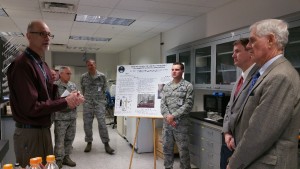 On Thursday, the delegation traveled to Colorado Springs. The day began at the United States Air Force Academy for a series of briefings and tours. The delegation was met by Lt. Gen. Michelle Johnson, Superintendent, and Brig. Gen. Andrew Armacost, Dean of the Faculty. Both senior leaders stressed their awareness that climate change is a national security issue, and other support for academic programs at the Air Force Academy are examining a wide range of climate change challenges.
On Thursday, the delegation traveled to Colorado Springs. The day began at the United States Air Force Academy for a series of briefings and tours. The delegation was met by Lt. Gen. Michelle Johnson, Superintendent, and Brig. Gen. Andrew Armacost, Dean of the Faculty. Both senior leaders stressed their awareness that climate change is a national security issue, and other support for academic programs at the Air Force Academy are examining a wide range of climate change challenges.
The delegation was then briefed on the Air Force Academy energy program, which currently involves ground source heat pumps, photovoltaic roofing material, methane recovery from sludge, and a major 6 MW solar array on Academy grounds. Academy personnel then briefed on the Academy’s energy curriculum, which includes a variety of casework, independent study and summer research. Courses involved in this program include Introduction to Environmental Engineering, and Sustainability and Green Engineering, Energy Conversion, and Sustainable Energy – important programs and military Academy.
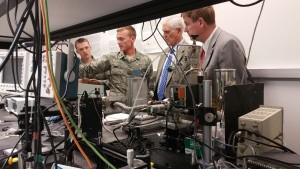 Following briefings the delegation toured a series of laboratories engaged in energy research. The Department of Biology supports a lab focused on extremophilic organisms, while the Chemistry Department poses a lab working on lithium battery improvements. The delegation also toured a lab run by the Department of Electoral Engineering, as well as a Physics Department lab working on Black Silicon photovoltaic cells – a cutting-edge technology with the potential to vastly increase the effectiveness of photovoltaic systems.
Following briefings the delegation toured a series of laboratories engaged in energy research. The Department of Biology supports a lab focused on extremophilic organisms, while the Chemistry Department poses a lab working on lithium battery improvements. The delegation also toured a lab run by the Department of Electoral Engineering, as well as a Physics Department lab working on Black Silicon photovoltaic cells – a cutting-edge technology with the potential to vastly increase the effectiveness of photovoltaic systems.
Colorado Springs World Affairs Council
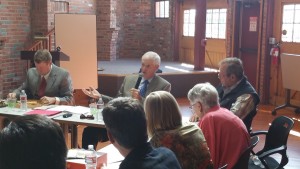 A luncheon for the delegation was hosted by the Colorado Springs World Affairs Council. Roughly 25 local leaders attended the discussion. As with the Denver World Affairs Council the day before, Bidlack began the presentation by laying out the science and facts of climate change, and General Jameson discussed various international stress points made worse by climate change. The question-and-answer period that followed was focused on World Affairs Council members’ international travel, which in several cases demonstrated the reality of the impact of climate change on international security concerns.
A luncheon for the delegation was hosted by the Colorado Springs World Affairs Council. Roughly 25 local leaders attended the discussion. As with the Denver World Affairs Council the day before, Bidlack began the presentation by laying out the science and facts of climate change, and General Jameson discussed various international stress points made worse by climate change. The question-and-answer period that followed was focused on World Affairs Council members’ international travel, which in several cases demonstrated the reality of the impact of climate change on international security concerns.
Fort Carson
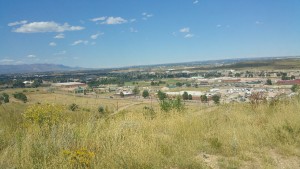 The final event of the American Security Project Colorado trip was a visit to Fort Carson, home of the 4th Infantry Division, and one of the Army’s posts selected for “Net Zero” status – with the goal of having a net zero emission on energy consumption. Fort Carson is particularly significant on issues of environment, energy, and climate change due to its size and mission. With over 26,000 active-duty members, over 6000 Army civilians, it is a major base. In addition, Fort Carson controls 236,000 acres in the Piñon Canyon Maneuver Site, located in southern Colorado. Particularly important issues for sustainability at Fort Carson are energy use and water management.
The final event of the American Security Project Colorado trip was a visit to Fort Carson, home of the 4th Infantry Division, and one of the Army’s posts selected for “Net Zero” status – with the goal of having a net zero emission on energy consumption. Fort Carson is particularly significant on issues of environment, energy, and climate change due to its size and mission. With over 26,000 active-duty members, over 6000 Army civilians, it is a major base. In addition, Fort Carson controls 236,000 acres in the Piñon Canyon Maneuver Site, located in southern Colorado. Particularly important issues for sustainability at Fort Carson are energy use and water management.
The delegation was met by Vince Guthrie, Utility Programs Manager in the Directorate of Public Works, and Hal Alguire, Fort Carson Public Works Director. Guthrie and Alguire drove the delegation to a variety of locations around Fort Carson highlighting both the energy successes and the environmental challenges of operating such a large base with a net zero goal. An exacerbating factor in reaching environmental goals has been the remarkable explosion in construction at Fort Carson in recent years. Alguire noted that Fort Carson has had the better part of $1 billion spent on construction recently, to include a number of large new buildings and retrofitting of old buildings.
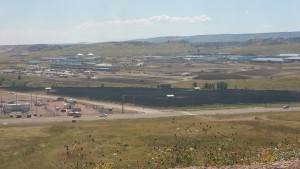 Fort Carson has invested heavily in solar technology as well as more passive technologies such as adding external shading walls to self-effacing buildings and installing water-absorbing paver stones in parking lots particularly susceptible to storm water runoff. The delegation was told that the net zero goal may be very difficult to reach, given the challenge of short budget cycles and the need for long-term solutions. It remains to be seen, in spite of major efforts being made by a number of Public Works employees, how successful Fort Carson will ultimately be in reducing its energy footprint.
Fort Carson has invested heavily in solar technology as well as more passive technologies such as adding external shading walls to self-effacing buildings and installing water-absorbing paver stones in parking lots particularly susceptible to storm water runoff. The delegation was told that the net zero goal may be very difficult to reach, given the challenge of short budget cycles and the need for long-term solutions. It remains to be seen, in spite of major efforts being made by a number of Public Works employees, how successful Fort Carson will ultimately be in reducing its energy footprint.
Authored by Lt Colonel Hal Bidlack, Ph.D. (USAF, Ret.)






I’m wondering if Senator Michael Bennet was aware of ASP’s events in Colorado. Senator Bennet is regarded as very vulnerable in next year’s election, and he is a strong advocate in the area of climate change. While he does not yet know who is opponent will be in the election, it is virtually a certainty that Senator Bennet’s position on environmental issues generally will be more progressive and well informed and consistent with ASP’s position than his opponent. Is there any way that he could derive some benefit from your work in Colorado ? Alex Boyle